AI, Fintech & the New Pipes: September Momentum in SEA & MENA
SEA MENA Highlight Investment Funding 7 Minutes
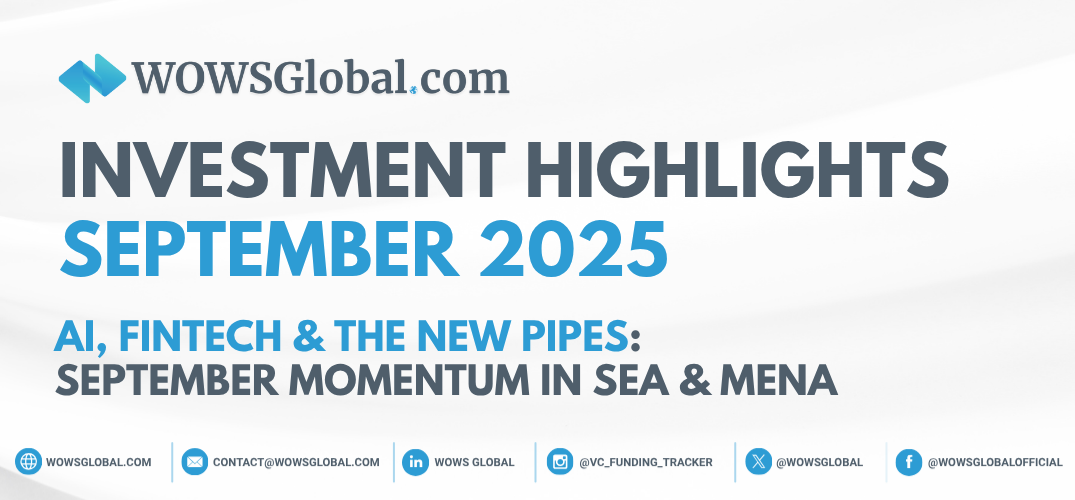
September wasn’t a spray-and-pray month, it was precision capital at work. Across MENA, venture debt and sovereign-adjacent money kept fintech and AI humming, while new funds signaled deeper, patient capital for the region. In SEA, founders who pair growth with operational discipline continued to attract checks, alongside the return of structured financing (credit lines, bonds) and strategic investors testing bolder theses.
Three patterns stand out:
-
Debt is mainstream—from Saudi P2P and GCC open banking to PH consumer fintech tapping Nordic bonds.
-
AI with utility beats AI as spectacle—translation infra, enterprise AI, and healthtech monetization are winning.
-
Platform funds (corporates, sovereign-linked GPs, and cross-border FoFs) are shaping pipelines as much as classic VCs, especially in MENA.
Southeast Asia (SEA): Profits, Product Moats, and Structured Capital
Fewer vanity rounds, more operator math: SEA rewarded builders with margins, moats, and measured expansion.
-
Salmon (Philippines) — $88M (incl. $28M equity + $60M Nordic bond drawdown).
Salmon is mixing equity with a structured bond program to fund expansion without over-diluting. The playbook, regulated bank + consumer credit + new deposits, positions it as a full-stack challenger. In a higher-rate world, access to diversified debt is a moat, not a footnote. -
Bluente (Singapore) — $1.5M Seed+ for AI document translation. Bluente is tackling the unglamorous backbone of global business: accurate, compliant translation at enterprise scale. Think contracts, KYC, healthcare, and public tenders, places where errors are expensive. The wedge is narrow but defensible, and expansion into the Middle East is a logical next lane.
-
Whale (Singapore) — $60M (Series C1/C2) for enterprise AI.
Whale is raising to deepen R&D and win global logos, because in enterprise AI, trust and delivery beat demos. The investor mix (sovereign-linked and strategic) suggests long horizons and distribution leverage. Expect more verticalized products where model ops meet measurable ROI. -
FirstClub (India) — $23M Series A for premium quick commerce. FirstClub is betting that curation, not just speed, will win affluent baskets ahead of the holiday crush. The capital goes to dark stores, supply assurance, and an experience that feels less “top-up” and more “concierge.” If the model holds in Bengaluru, expansion becomes a play in density economics.
-
DACHIN (Singapore-HQ / Indonesia focus) — $16.7M for data-driven D2C brand creation. DACHIN’s game is pattern recognition at scale: find signals, spin brands, and pipe them through omni-channels. Indonesia offers the demand; the challenge is supply consistency and retention. With fresh capital for analytics and distribution, the flywheel spins faster.
-
Venturi Partners (Singapore) — Fund II first closed at $150M (target $225M). Venturi is doubling down on consumer brands across India and SEA, retail, healthcare, education, FMCG. The thesis favors durable categories where customer love outlasts cycles. In a cautious market, growth-stage dollars with category expertise are exactly the lifeline founders need.
MENA: Fintech Depth, AI Funds, and Steady Venture Debt
Across MENA, investors doubled down on infrastructure-first bets, from open banking and P2P finance to AI with data and distribution.
-
Erad (Saudi Arabia) — $33M venture debt to scale SME financing in KSA/UAE. Erad’s new debt line signals how venture debt is moving from niche to mainstream in the GCC. The facility gives the fintech dry powder to underwrite more merchant growth without heavy equity dilution. It’s a timely bet on real-economy SMEs that need working capital more than vanity valuations.
-
Rasmal Innovation Fund I (Qatar/Tunisia) — $4M commitment from Tunisia’s ANAVA Fund of Funds. The ANAVA commitment is a cross-Maghreb bridge that funnels patient capital toward earlier-stage gaps. It also broadens Rasmal’s geographic aperture, nudging more deal flow between the Gulf and North Africa. Expect more co-investment syndicates to form as this fund catalyzes regional pipelines.
-
Presight (UAE) — Launched a $100M global AI innovation fund (with Shorooq Partners). Presight is pairing checks with compute, data access, and go-to-market heft—exactly what AI founders need beyond cash. The fund targets applied AI across smart cities, energy, fintech, and more, turning the UAE into an enabler of infrastructure-grade AI. This is capital with accelerants, not just capital with press releases.
-
Stride Ventures (India → Gulf) — Plans to deploy $200M in Saudi Arabia. Stride’s Saudi move is a vote of confidence in the Kingdom’s venture debt appetite, and its pipeline of bankable startups. The strategy offers founders runway without ownership burn, aligning with today’s efficiency-first market. If executed well, it could reset the region’s default financing mix beyond straight equity.
-
PayPal (MENA/Africa) — Commits $100M to digital commerce. PayPal’s pledge brings global rails and partnership gravity to local fintech ecosystems. The money is as much signal as substance: international strategics see real markets, not experiments. For startups building payments, risk, and merchant tools, this is a tailwind you can price into your pipeline.
-
MoneyMoon (Saudi Arabia) — $2.9M pre-Series A; Sharia-compliant, Murabaha-based P2P under SAMA’s sandbox. MoneyMoon is stitching modern UX onto faith-aligned finance, and the sandbox gives it room to scale responsibly. Murabaha mechanics offer clarity on pricing and risk that retail users can understand. It’s a homegrown product for a home-market need, built to travel across the Gulf.
-
Spare (Saudi Arabia) — $5M pre-Series A to accelerate open-banking integrations across MENA. Spare is laying the pipes for account-to-account payments, verification, and recurring billing, boring in the best possible way. With more bank connections, merchants get faster settlements and lower costs than card rails. Infrastructure like this doesn’t hog headlines, but it powers the ones that do.
-
Munify (Egypt) — $3M seed to build a diaspora-focused neobank and remittance rails.
Munify is chasing a massive corridor: Egyptians abroad who send money home and need credible local services. The neobank pitch blends remittances, savings, and SMB tools into one app, sticky if executed well. Cross-border partnerships will be the make-or-break for speed and unit economics. -
Starvania Studio (Saudi Arabia) — $1.1M to scale console/PC game development and talent pipelines. Saudi’s games push isn’t just about publishing; it’s about building studios that can ship globally. Starvania’s raise targets production muscle and senior hires, the hard stuff that separates promise from product. It’s another proof point that creative tech now sits alongside fintech in the Kingdom’s ambition stack.
Meet the Money Movers
If September proved anything, it’s that capital providers, from venture lenders to platform funds and strategics, are shaping the story as much as founders.
In Southeast Asia, sovereign-linked and strategic LPs took the wheel. Temasek, BOSCH Ventures, and Singtel Innov8 backed Whale's $60M raise, while Informed Ventures led Bluente's Seed+ to build translation rails that big enterprises actually use. Accel and RTP Global powered FirstClub’s premium quick-commerce push, and Venturi Partners’ $150M first close signaled fresh growth capital for consumer brands, just as Salmon blended equity with a Nordic bond drawdown to scale a regulated, pan-SEA fintech.
In MENA, the pipes got thicker and smarter. Anb Seed Fund led Spare’s $5M pre-Series A alongside a deep local syndicate, Core Vision fronted MoneyMoon's Sharia-compliant P2P round, and ANAVA’s commitment into Rasmal Innovation Fund I tightened cross-GCC, North Africa links. Presight partnered with Shorooq on a $100M AI innovation fund, PayPal pledged $100M to digital commerce across MENA/Africa, and Stride Ventures mapped a $200M venture-debt playbook for Saudi, while creative tech wasn’t left out, with Merak Capital and Impact46 backing Starvania Studio.
The thread? Debt, data, and discipline. Global strategics and regional GPs are betting on builders of infrastructure, open banking, AI tooling, and consumer rails, where dollars compound and distribution travels. Local funds are taking conviction shots on region-specific needs; international players are supplying the muscle for speed and scale.
WOWS’ Take: Local Conviction, Global Firepower
The September pattern is clear: precision capital > blanket risk-on. Debt facilities and platform funds are doing as much heavy lifting as classic equity rounds. In SEA, profitability leaders (e.g., Sea) are rewarded; in MENA, fintech infra and AI stacks keep drawing both global strategics and regional fund-of-funds. For founders, the bar is fundamentals, unit-level clarity, and a path to margin, not just narrative.
Want tailored insights on your market or round?
Follow WOWS Global for the latest SEA & MENA intel, and contact us to discuss how we can help sharpen your fundraising strategy.
Related Posts
-
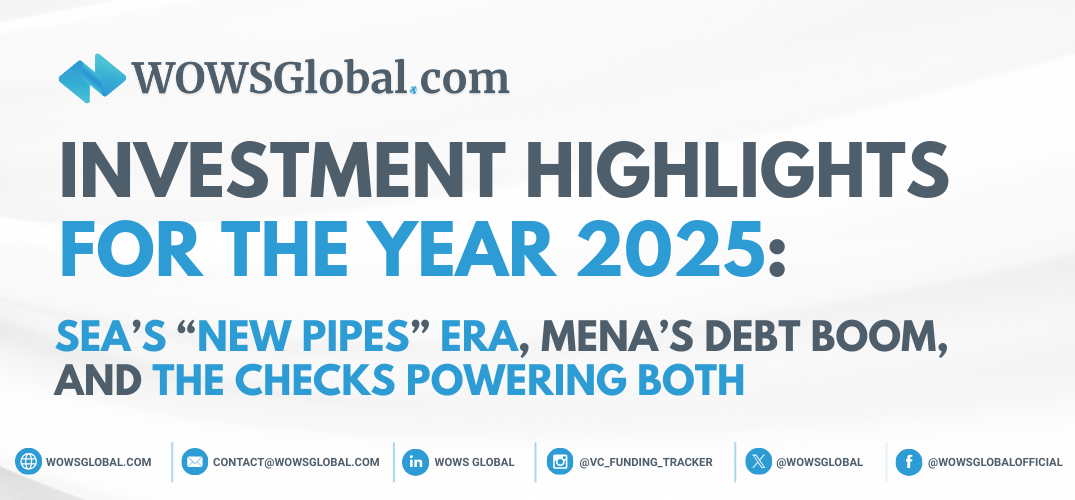
MENA Investment SEA Highlight 11 Minutes
Investment Highlights for the year 2025: SEA’s “New Pipes” Era, MENA’s Debt Boom, and the Checks Powering Both
In 2025, capital in SEA and MENA didn’t disappear, it changed shape. This report tracks the region’s most telling deals, the rise of structured financing, and the funds and strategics still writing checks as the market shifts into a 2026 execution race. -

Investment SEA MENA Startups Fundraising 7 Minutes
SEA & MENA Keep the Deal Flow in Play
From Singapore’s AI power grid bets to Saudi Arabia’s fintech plays, November was a steady, disciplined month for startup funding across Southeast Asia and MENA. This recap breaks down the key deals, what they signal about deep tech, fintech and infrastructure in both regions, and how WOWS Global helps investors and founders shape a smarter fundraising game plan. -
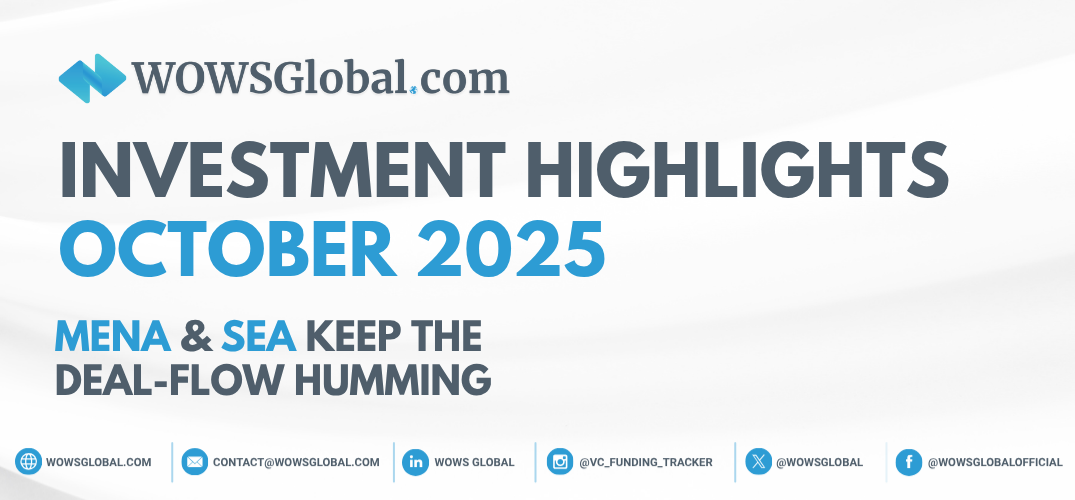
MENA SEA Startup & Venture Capital Investment 6 Minutes
Investment Highlights for the month of October: MENA & SEA keep the deal-flow humming
From Riyadh to Singapore, October delivered steady financings across AI enterprise, fintech rails, and asset-heavy platforms. Our report breaks down the biggest rounds, why structured capital is rising, and exactly who’s writing the checks, plus WOWS’ take on what it means for founders. -
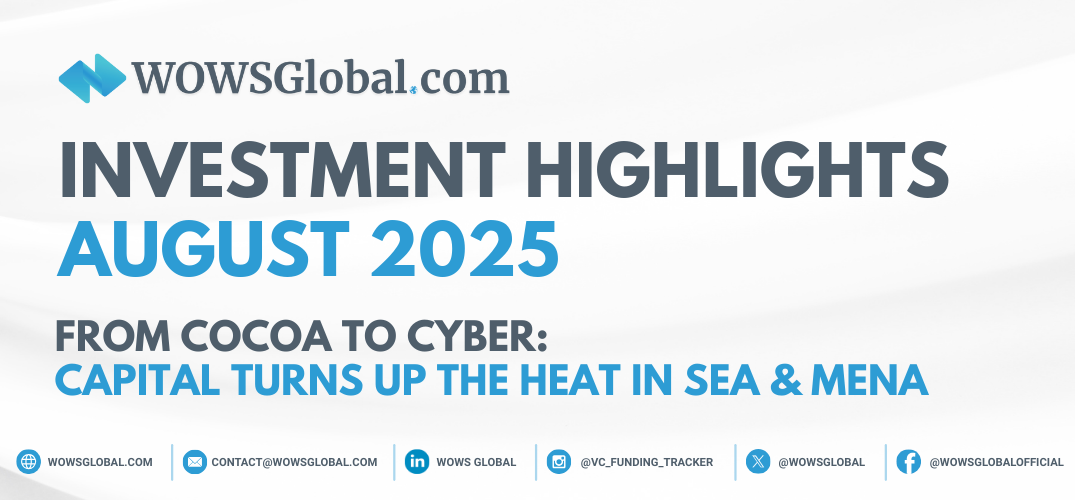
Startup Investment Highlight Startup & Venture Capital 8 Minutes
From Cocoa to Cyber: Capital Turns Up the Heat in SEA & MENA
August 2025 kept the funding heat alive across Southeast Asia and MENA. From sustainable cocoa in Singapore to $100M cybersecurity bets in Tel Aviv, investors backed startups big and small. Discover the top deals, new funds, and investor moves shaping these fast-growing ecosystems. -
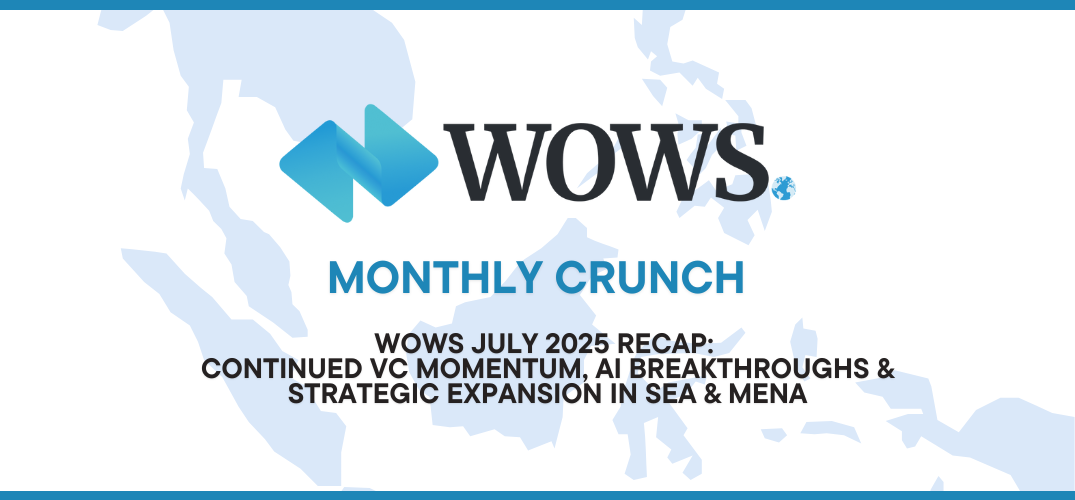
WOWS Monthly Crunch WOWS Dealflow SEA AI Demo Day AI Startups 3 Minutes
July Surge: SEA & MENA’s Capital Momentum
July 2025 saw investor momentum soar across Southeast Asia and MENA, with standout funding stories like Lytehouse, Dolan, and Sembuh AI driving innovation in smart surveillance, travel, and healthcare fraud detection. Backed by active early-stage players such as Ansible Ventures and Founders Launchpad, B2B and AI funding surged across the region. -

Startup Funding AI Startups SEA 5 Minutes
WOWS June 2025 Recap: VC Momentum, AI Deals & Strategic Growth Across SEA & MENA
Join WOWS Global as we look back at a fast-paced June 2025, from bold venture bets and AI innovations to demo day milestones and strategic finance solutions. Explore the dealflow, investors, and regional progress shaping the startup ecosystem across SEA and MENA. Apply insights, drive action.
